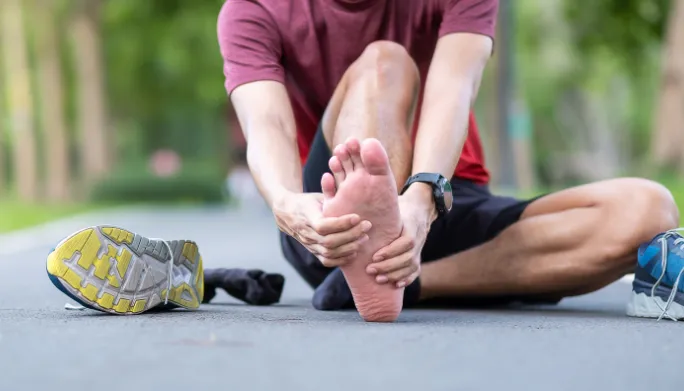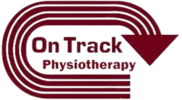On Track Physiotherapy
Plantar Fasciitis in Ann Arbor

Finding Relief from Plantar Fasciitis in Ann Arbor
If you’re an athlete or former athlete in the Ann Arbor area struggling to stay active due to nagging heel and arch pain, you may be suffering from plantar fasciitis. At On Track Physiotherapy, our physical therapists specialize in comprehensively assessing and treating this common condition to get you back on your feet again – literally.
Characterized by stabbing pain under the heel that’s often most intense with the first steps of the day or after long periods of rest, plantar fasciitis can severely impact your ability to walk, run, workout, or participate in sports. Our targeted manual therapy techniques, stretches, exercises, and self-management strategies aim to tackle the root causes of your discomfort and inflammation and resolve it for good.
What Exactly Is Causing My Heel Pain?
Your plantar fascia is a thick band of fibrous tissue that runs along the bottom of your foot. Acting as a shock absorber and support mechanism for the arch, this ligament connects your heel bone to your toes and maintains the foot’s structure during activity. When overused and stressed from repetitive impact and strain over time – especially among runners and athletic populations – the plantar fascia can become irritated and inflamed. This is known as plantar fasciitis.
The most noticeable symptom is typically pain concentrated under the heel or in the arch of your foot that’s worse when taking the first few steps after long periods of inactivity. This pain may radiate forward along the sole as well. You may also experience some swelling, stiffness, or difficulty flexing your foot. Left untreated, plantar fasciitis tends to progressively worsen and can sideline you from sports, workouts, or even daily active living long-term. The good news? With the right rehabilitative techniques, we can help you finally resolve this hindrance for good.
A Comprehensive Approach to Tackling Plantar Fasciitis in Ann Arbor
At On Track Physiotherapy, our certified physical therapists utilize an array of manual, exercise-based, and self-management interventions designed specifically to address the root causes of plantar fasciitis and get our patients back to peak physical performance. Our treatments aim to accomplish three primary goals:
1. Calm Pain and Inflammation
Via gentle tissue massage, friction rubs, stretching, instrument-assisted techniques and other modalities, we first work to improve blood flow, relax the plantar fascia, break up scar tissue adhesions, and stimulate healing processes in the irritated ligament and surrounding structures. This helps rapidly reduce discomfort and swelling.
2. Restore Flexibility, Strength & Foot Function
Once initial irritation has calmed, we guide you through an evidence-based rehab protocol incorporating foot and lower extremity stretches and exercises that enhance flexibility, strengthen intrinsic and extrinsic foot musculature, retrain proper movement patterns, and optimize impact attenuation – taking stress off the plantar fascia.
3. Prevent Re-Injury Through Education & Self-Care
Arming our patients with at-home maintenance strategies is key for sustaining results long term. Our therapists educate you on ideal footwear choices, custom orthotic options, activity modification guidelines, continued stretching/strengthening, night splints, icing best practices, and other self-management tools to independently keep plantar fasciitis at bay.
By addressing all these areas simultaneously, we empower our patients to achieve lasting alleviation from plantar fasciitis flare-ups and get back to daily living and athletic pursuits pain-free.
Why Treat Plantar Fasciitis with Physical Therapy?
Attempting to push through foot discomfort without addressing the root causes tends to make matters worse over time. On Track Physiotherapy offers distinct advantages over other plantar fasciitis treatment alternatives:
Non-Invasive & Drug-Free
Unlike cortisone injections which carry risks, provide only temporary relief, and may weaken tendons long-term, our physical therapy interventions avoid medications and are grounded in stimulating your body’s inherent healing capacity.
Personalized Game Plan
No two patients or cases of plantar fasciitis are identical. Following a thorough movement analysis, we create customized treatment regimens tailored to your unique foot type, activities, impairments, and goals.
Treat Contributing Factors
Rather than just managing symptoms in the foot, we also assess biomechanics up the kinetic chain that could be exacerbating plantar fascia strain, like poor hip/ankle mobility or faulty running mechanics. We correct these issues as part of our comprehensive approach.
Equip You With Prevention Strategies
Learning how to independently manage and prevent future bouts through at-home care, appropriate footwear, activity modifications, and more helps you sustain your results well beyond the clinic doors without ongoing appointments.
Regaining the ability to workout, run pain-free, or simply get through your day without nagging heel and arch discomfort may feel like a distant memory with plantar fasciitis. But implementing targeted physical therapy for this perturbing foot condition can help defy expectations and finally resolve your pain long term.
Frequently Asked Questions
We understand you likely have plenty of questions about plantar fasciitis treatment. Here we address some of the most common ones posed by our patients:
Will Plantar Fasciitis Resolve on Its Own if I Just Give it Time and Rest?
In some mild cases, the inflammation may eventually settle down with extended rest periods of 6-12 months. However, taking this passive approach tends to lead to repeated flare-ups and progression of symptoms. Jumping back into activities too quickly further risks re-injury. Our active interventions help speed healing and equip you to continue staying active at appropriate levels while avoiding setbacks.
Is It Counterproductive to Keep Walking or Exercising On My Feet?
Continuing to push through substantial pain often worsens inflammation. However, controlled activity within a moderate discomfort threshold combined with proper recovery techniques can help promote blood flow and healing. Our therapists guide you on appropriate activity modification and self-management strategies while building tolerance levels back up progressively. The key is finding the sweet spot between rest and stimulus through customized programming.
Should I Stay Completely Off My Feet to Let Things Calm Down?
During acute flare-ups, we do recommend a short period (1-2 weeks) of limiting foot-intensive workouts and impact. However, gentle movements like biking, swimming, or upper body training can be maintained to avoid deconditioning. Manual therapy and moderate stretching and strengthening during this period also move healing along without aggressive weight-bearing. The goal is to calm irritation while immediately working to improve mechanics and function for an efficient full return. Our team determines the right rest-to-movement balance based on your response.
Meet Your Plantar Fasciitis Recovery Team
At On Track Physiotherapy, our close-knit staff offers nearly 40 combined years of restoring lower extremity biomechanics and eliminating nagging pains like plantar fasciitis through targeted manual/exercise interventions and patient education.
Dr. Greg Schaible, PT, DPT
With years of orthopedic and sports rehab experience working with patients of all ages, Dr. Greg Schaible leads our team in performing comprehensive movement assessments, creating customized treatment plans, and ensuring patients develop self-management skills for lasting outcomes beyond the clinic.
Dr. Morgan Kennedy, PT, DPT
Dr. Morgan Kennedy brings firsthand insight into the biomechanical demands of endurance sports and is passionate about helping athletes optimize performance and prevent overuse injuries through corrective exercises, manual therapy, and activity-specific programming.
Our entire physical therapy team looks forward to partnering with you to pinpoint the root causes of your plantar fascia pain, resolve it fully, and get you back out doing what you love pain-free.
Take the First Step Toward Pain Relief
If lingering plantar fasciitis continues limiting your active lifestyle or athletic pursuits, take action now toward lasting relief by scheduling a comprehensive evaluation at On Track Physiotherapy. Call 734-972-6529 or request an appointment online to get started. We’ll perform a thorough assessment to identify impairments up and down the kinetic chain driving your heel and arch discomfort, then develop a customized treatment plan to tackle it through hands-on manual therapy, targeted stretches and strengthening, activity modifications, footwear recommendations, and self-care education.
With an active, multi-pronged approach guided by advanced competency in foot and lower extremity rehabilitation, our team can help defy expectations and finally get your plantar fasciitis under control for good. Take the first step toward confidently staying active on your feet pain-free by contacting us today!
About The Author
Conquering sports injuries with personalized care is Dr. Greg Schaible’s passion. This licensed Physical Therapist specializes in Certified Strength & Conditioning and Sports Rehab, drawing upon years years of experience to help individuals overcome sports injuries and its challenges. At On Track Physiotherapy in Ann Arbor, Dr. Greg Schaible employs a patient-centered approach, wielding cutting-edge techniques and bespoke care plans to empower individuals to reclaim their physical well-being.


